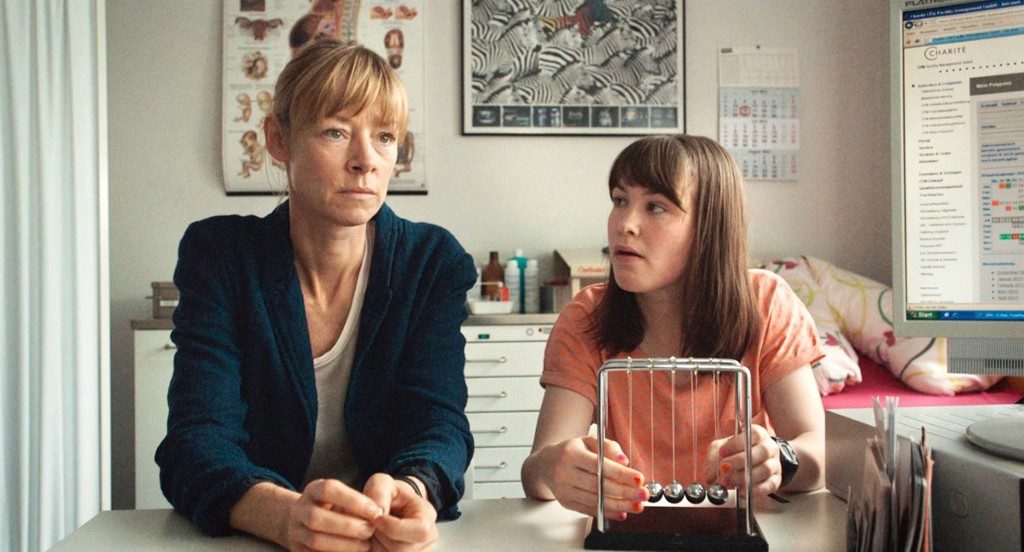Born in Basel in 1964, Stina Werenfels spent her early childhood in the USA, Greece, and Spain. After her degree in pharmacology, she went on to study film at New York University’s Tisch School of the Arts in 1991, where she attended master classes taught by Spike Lee, Arthur Penn, and Marketa Kimbrell. There, she completed her studies with the prize-winning documentary Fragments from the Lower East Side (1994), which described the vanishing Jewish culture from New York neighborhoods.
Back in Switzerland, Werenfels shot Pastry, Pain & Politics (1998), for which she was given, amongst other awards, the Swiss Film Prize for best short film. Her first movie feature Nachbeben (2006) premiered at the Berlinale Panorama and went on to win several awards. (Press materials)
Dora will be playing at the 2015 Berlin International Film Festival.
W&H: Please give us your description of the film playing.
SW: This is the story of the sexual awakening of 18-year-old Dora, a mentally handicapped young woman, and how this throws her family into flux when Dora eventually falls pregnant. It focuses on the shifting relationship between mother and daughter as the mother comes to terms with letting go of her own childbearing years and her little girl at the same time. The film discusses questions of self-determination for people with disabilities and questions of contemporary female identity.
W&H: What drew you to this story?
SW: The film is based on the famous play by Lukas Bärfuss, in which a disabled young woman decides to have sex with men who seemingly abuse her. To enter this grey zone of what is right and wrong, what is “normal” and what is not, fascinated me. The play gave me the opportunity to bring in two strong female perspectives regarding fertility and motherhood. I knew right away that I wanted to tell this story visually from two perspectives.
W&H: What was the biggest challenge in making the film?
SW: The film took us seven years to put together, so financing was definitely the most challenging part. It meant convincing people to finance a screenplay that featured taboo subjects such as sexuality and the parenthood of disabled people that contained some rather explicit scenes. Luckily, my actors were all great and daring, so directing was a very collaborative process.
W&H: What do you want people to think about when they are leaving the theatre?
SW: First, I’d like to have people in the audience reassess their views on disability. Dora is not a victim. She’s choosing life at its fullest. This causes stress in the family, but the voyage she puts her mother on is one towards her own life goals. Though we’re all proud to live in a free society, our views of human beings become more and more standardized. With prenatal screenings, an often hidden alliance of medical and eceonomic interests, [there is the] creat[ion of] the new, “efficient” human.
Secondly, the film raises the feminist question of how far are we as women/mothers tied up in our relationships to our bodies and to our children. I believe that in a time where all personal ties are beginning to dissolve, the mother role is idealized in society. The concept of a maternal instinct, for example, revives an almost archaic dimension, something that eventually turns against women in society. Because mothers are made responsible, [and only them]. There’s a great deal of loneliness in this, and this is what Kristin, Dora’s mother, goes through.
W&H: What advice do you have for other female directors?
SW: Find the right allies for true creative partnerships. And as Lina Wertmüller said, “Don’t take a no for a no, or else you are not a filmmaker.”
W&H: What’s the biggest misconception about you and your work?
SW: That a cutie pie will make a sweet film with a darling story and a nice little budget.
W&H: How did you get your film funded? Share some insights into how you got the film made.
SW: Dschoint Ventschr Filmproduktion in Zurich had produced all of my films before. They were adamant about doing this film with me. Then we talked Swiss Public Television into it. They had liked my previous work, but this film is definitely not prime-time movie material. When Edouard Stöckli, a well-known producer and arthouse film lover, heard about my problems, he offered to step in with substantial help. Then we decided to take a loan and wrap a package that would allow us to make the film with the German DFFF. I think it helped to have Lars Eidinger on board. He’s a German cult actor, known for his daring performances.
From there, everything had to happen very fast because we only had a short time slot with my actors. I flew to Berlin and my husband [Samir], the producer of the film and a filmmaker himself, stopped working on his own documentary Iraqi Odyssee to look after our daughter.
W&H: Name your favorite women directed film and why.
SW: I love how Jane Campion melts content and the visual into powerful stories. I think I learned a great deal through her depiction of female intimacy while watching An Angel at My Table.
I’d also like to remind everyone of Swiss filmmaker Gertrud Pinkus. Her landmark feminist film Il Valore Della Donna e il Suo Silenzio [The Woman’s Greatest Value Is Her Silence] (1979) should be seen again and again. It’s about the female condition under the circumstances of emigration, shown in wonderful poetic imagery.






